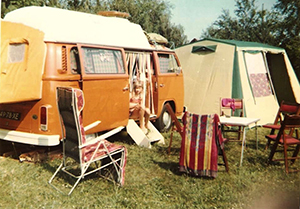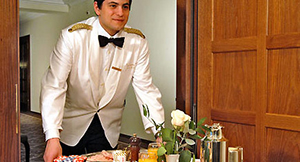
 A late night phone call on the Friday of a holiday weekend (Canadian Thanksgiving).
A late night phone call on the Friday of a holiday weekend (Canadian Thanksgiving).
An expectation that there would be ‘instant gratification’.
After all, it’s possible to order a pizza, book a flight to San Diego, and speak to a help-desk person in India to deal with a computer issue, so why not book a vacation rental.
What’s the difference?
So, on Friday night when our call centre paged one of our staff to ask him to call back a potential guest looking to book a rental immediately, there was a conflict of expectations.
On our part, we are a small agency covering a huge area with over 10 hours travelling time between our most easternmost and westernmost properties. We rely on our owners or their caretakers to ensure readiness of the properties under their management, but they generally need at least 24 hours notice of a reservation. Even in those properties that we know always maintain a rental-ready status, we can’t guarantee it without a check first.
On the guests part, she wanted accommodation and wanted it now.
In these days of the Book Now button, it should perhaps be easier all round for everyone to be satisfied, but let’s be practical. We are not Holiday Inn’s or Hilton’s that have 24-hour operations, yet vacation rentals are being touted as just as mainstream and therefore, in the perception of prospective guests we should be as accessible.
The expectation of immediacy of booking isn’t the only one that is impacting owners – demands are increasing and it’s worthwhile being aware of how this has come about and recognizing, it’s not about to go away.
Where we were…
 A decade ago, we were far less demanding and so much more adaptable in terms of what was acceptable in a rental property. I see it this way.
A decade ago, we were far less demanding and so much more adaptable in terms of what was acceptable in a rental property. I see it this way.
In the earlier days of vacation rental the demographic being attracted were those who were previously ‘campers’. They had spent holidays in campgrounds and housekeeping resorts where amenities were basic and accommodations of a more primitive nature. Self-sufficiency was the key to enjoying a great family vacation – kids bunked in together or slept on the floor in sleeping bags; it was fun making-do with whatever the owner had left in the kitchen, and evening entertainment was playing a game of Monopoly or Clue where nobody cared if there were missing pieces, or if the playing cards were old and dog-eared. Televisions were rare and were mostly of the ‘rabbit ears’ variety. Families created their own fun.
Where we are now…
 Over the years, as our form of vacation accommodation has evolved and been marketed so intensely, the rental demographic has changed. Rentals have been hotly promoted as an alternative to hotels and higher end resorts, and todays clientele have markedly different expectations than those in the past. The phrase ‘that is so last century’ really does apply to many vacation homes that have not kept up with the fast pace of change.
Over the years, as our form of vacation accommodation has evolved and been marketed so intensely, the rental demographic has changed. Rentals have been hotly promoted as an alternative to hotels and higher end resorts, and todays clientele have markedly different expectations than those in the past. The phrase ‘that is so last century’ really does apply to many vacation homes that have not kept up with the fast pace of change.
I see this in my own expectations. My family was the camping type, having spent years of family holidays tenting across Europe before transitioning to renting homes in England and Europe. Now, we vacation with our children and grandchildren in high end rental properties in the US, South America and the Caribbean and have noticeably higher standards. We choose this variety of accommodation because we like the ability to all be together in one area, to cook and cater for ourselves, and enjoy private amenities. For the price we pay, we expect high quality amenities, plenty of entertainment options; very comfortable beds and good service from the owners. We want to feel welcomed as ‘guests’ and not ‘renters’.
What’s changed?…
 While we can argue that the very nature of vacation rentals requires some degree of self-sufficiency I’d argue that it is more removed than ever from the guest psyche.
While we can argue that the very nature of vacation rentals requires some degree of self-sufficiency I’d argue that it is more removed than ever from the guest psyche.
I recently heard of a few incidents of guests seeming to believe they were in a resort or hotel, asking for items to be delivered or a minor repair carried out. The first was a call to a caretaker saying there was no hairdryer supplied and could one be delivered ‘as soon as possible’. Second, was the message left for an owner that a light bulb required changing in a hallway, and that it was OK to let himself in as the family would probably be on the waterfront, and he need not disturb them. Finally, we as rental agents were surprised by the family arriving from Saudi Arabia, whose first question on arrival at the property was “Where’s the food?” Their version of a vacation rental apparently included fully stocked cupboards and refrigerator.
While we can shake our heads in disbelief, it’s also important to be aware of the nature of expectations and how the rising popularity of our style of vacation accommodation is bringing a new generation of rental guest to our doorsteps.
We have long been used to guests experienced in renting a vacation home each year; those who accept the quirks and oddities of self catering, and who enjoy the freedom and flexibility that rental brings. However, as more and more newcomers are being wooed by media reports and articles – those showing how celebrities are turning to rental properties to find more privacy are a good example – we should be aware of the expectations that are being raised and think of ways to inject some realism without turning off the wave of interest.
Guest Education
Many owners do offer a concierge service; those who are on site or may have a nearby caretaker are able to deliver additional services, however for many this is neither realistic nor practical. A better option would be to educate and inform from the outset, and ensure rental guests are fully aware of the difference between a vacation rental and a resort style bungalow with self-catering options. Here’s a few ideas:
Be honest and transparent
Don’t post photographs that could mislead potential guests. It’s fine to focus on the best qualities but don’t hide the negatives either. For example, posting an image of a beautiful sandy beach is great as long as you make it clear how far they have to travel to get to it. Privacy ranks highly on guest criteria so be careful not to create a false impression that your property is more private than it is. Being completely open about your property will create happier guests.
Keep your guests informed
Let your guests know if you make any changes or if any facility is removed or out-of-order. What may seem unimportant to you could have been the deal-maker to your clients in the booking process so it is imperative you inform them if something they were expecting is no longer available. This applies to anything that is shown in a listing, either in photographs or in amenity lists.
Before they arrive
Prepare your guests for their trip with a concise pre-arrival guide. This should include information on how they will get access to the property, accurate driving directions and what they should expect when they get there. A list of basic supplies is also helpful so guests know what they should bring. Use this document to prepare them for any quirks of the property such as water supply and septic systems, and garbage disposal instructions. In short, if guests will encounter significantly different ways of handling everyday household activities, let them know beforehand.
Cleanliness
Issues with cleanliness are the number one complaint made by rental guests. They expect the property they have rented will be spotlessly clean, inside and out and if it isn’t will be quick to complain about it. Giving this top priority will pay back in positive reviews and repeat bookings. A year-round property should be deep cleaned at least twice a year with a thorough changeover after each rental period. Doing a regular cleaning audit and a using a changeover checklist will help make sure nothing is missed.
Provide tourist information
Many of your guests will have experience of hotels or resorts and not be prepared for the vast differences offered by a vacation rental. While most of the differences are positive, some people can feel like a fish out of water when they have to organize their own entertainment. You can help by supplying a comprehensive Guest Guide that lists everything that is available in the local area – restaurants, shopping, attractions, golf courses etc.
Provide the essentials
Not providing essentials is likely to trigger service calls of one sort or another so make sure the property is fully equipped so ‘call-outs’ are not required. A spare hair dryer, additional lightbulbs and a stepstool are a few essential items.
Prepare the way
Write a page on your web site or blog describing the differences between hotel/resort accommodation and self-catering. Talk about the great benefits – space, privacy, a home-from-home environment with a well-equipped kitchen; not having to share a waterfront or boats….you know the advantages, so set them out. Then you can humorously mention the ‘drawbacks’ – like having to change the occasional lightbulb, or drive out to get some more milk.
Create a great Welcome Guide
Make it clear in your Welcome Guide who your guests should call “in case of an emergency”. It wouldn’t be fair to tell them to only call under those circumstances since they may have questions or concerns that need an answer, however there are ways to get this across. If you make your Guide really comprehensive, the time taken over this will pay back in reduced service calls. Tell them where they can go to shop, eat, and find local attractions, and provide a wealth of local tourist information.
Set boundaries
If you don’t meet your guests, make a quick call to them on the morning after their arrival to check if they have any questions. Then you can tell them it’s OK to call you with additional questions before a set time – say 6pm. This will prevent the 11pm panic call because they can’t figure out how to make the microwave work!
Will you meet all your guests’ expectations. Maybe, maybe not. There will always be the ones who have greater demands than you ever anticipated and throw you off balance. In general though as we know, our guests are wonderful people who we love to have stay, but let’s be prepared for a changing demographic and increased wants and needs.
Have you got any examples of the changing nature of our clients? How different are today’s guests to say, 10 years ago (if you’ve been in the business that long)? Let us know as I think we can all learn a lot from hearing these stories.
